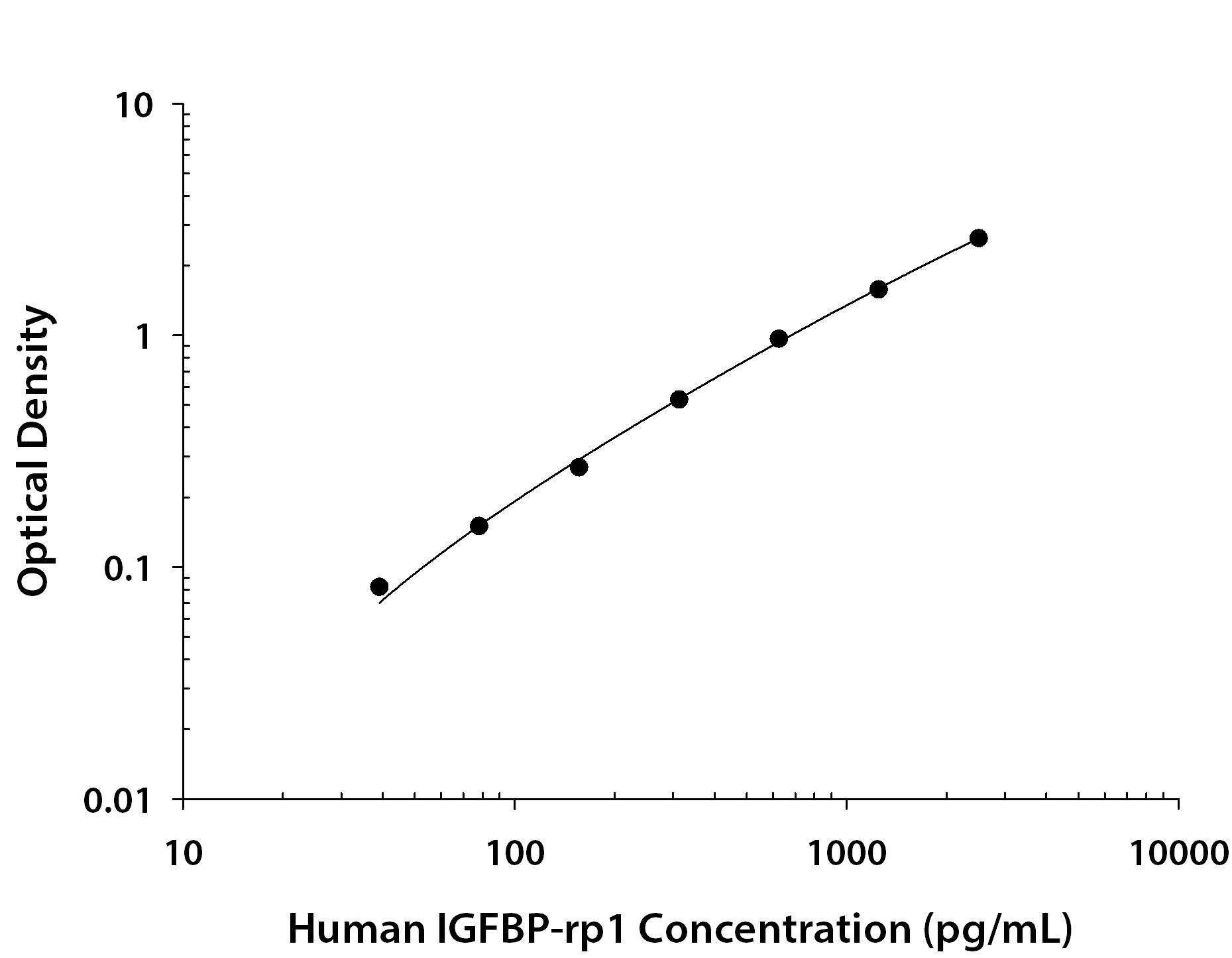Human IGFBP-rp1/IGFBP-7 Antibody
R&D Systems, part of Bio-Techne | Catalog # MAB1334

Key Product Details
Species Reactivity
Validated:
Cited:
Applications
Validated:
Cited:
Label
Antibody Source
Product Specifications
Immunogen
Asp30-Arg277
Accession # AAA16187
Specificity
Clonality
Host
Isotype
Scientific Data Images for Human IGFBP-rp1/IGFBP-7 Antibody
Human IGFBP‑rp1/IGFBP‑7 ELISA Standard Curve.
Recombinant Human IGFBP-rp1/IGFBP-7 protein was serially diluted 2-fold and captured by Mouse Anti-Human IGFBP-rp1/IGFBP-7 Monoclonal Antibody (Catalog # MAB13342) coated on a Clear Polystyrene Microplate (Catalog # DY990). Mouse Anti-Human IGFBP-rp1/IGFBP-7 Monoclonal Antibody (Catalog # MAB1334) was biotinylated and incubated with the protein captured on the plate. Detection of the standard curve was achieved by incubating Streptavidin-HRP (Catalog # DY998) followed by Substrate Solution (Catalog # DY999) and stopping the enzymatic reaction with Stop Solution (Catalog # DY994).Applications for Human IGFBP-rp1/IGFBP-7 Antibody
ELISA
This antibody functions as an ELISA detection antibody when paired with Mouse Anti-Human IGFBP‑rp1/IGFBP‑7 Monoclonal Antibody (Catalog # MAB13342).
This product is intended for assay development on various assay platforms requiring antibody pairs. We recommend the Human IGFBP-rp1/IGFBP-7 DuoSet ELISA Kit (Catalog # DY1334-05) for convenient development of a sandwich ELISA.
Western Blot
Sample: Recombinant Human IGFBP-rp1/IGFBP-7 (Catalog # 1334-B7)
Formulation, Preparation, and Storage
Purification
Reconstitution
Formulation
Shipping
Stability & Storage
- 12 months from date of receipt, -20 to -70 °C as supplied.
- 1 month, 2 to 8 °C under sterile conditions after reconstitution.
- 6 months, -20 to -70 °C under sterile conditions after reconstitution.
Background: IGFBP-rp1/IGFBP-7
IGFBP-rp1, also known as Mac25/Angiomodulin (AGM), tumor-derived adhesion factor (TAF) and prostacyclin-stimulating factor (PSF), is a secreted protein that contains three protein domain modules. Human IGFBP-rp1 cDNA encodes 282 amino acid (aa) precursor protein with a putative 26 aa signal peptide. Mature
IGFBP-rp1 is a glycosylated protein with an N-terminal IGFBP domain, followed by a Kazal-type serine proteinase inhibitor domain and a C-terminal
immunoglobulin‑like C2-type domain. The similarity of IGFBP-rp1 with the IGFBPs is confined to the N-terminal IGFBP domain, which contains all 12 of the conserved cysteine residues found in IGFBP1 through 5. Human and mouse IGFBP-rP1 are highly homologous. Human and mouse IGFBP-rp1 share 94% aa sequence identity. IGFBP-rp1 is expressed in many normal tissues and in cancer cells. It is abundantly expressed in high endothelial venules (HEVs) of blood vessels in the secondary lymphoid tissues. The expression of IGFBP-rp1 is upregulated in senescing epithelial cells and by retinoic acid. IGFBP-rp1 binds IGF and insulin with very low affinity and has been shown to enhance the mitogenic actions of IGF and insulin. IGFBP-rp1 also has IGF/insulin-independent activities. It interacts with heparan sulfate proteoglycans, type IV collagen, and specific chemokines. IGFBP‑rp1 supports weak cell adhesion, promotes cell spreading on type IV collagen, and stimulates the production of the potent vasodilator PGI2. It modulates tumor cell growth and has also been implicated in angiogenesis. IGFBP-rp1 is proteolytically cleaved between lysine 97 and alanine 98. Cleaved IGFBP-rp1 has enhanced cell attachment activity but can no longer bind IGF/insulin (1-3).
References
- Hwa, V. et al. (1999) Endocrinology Rev. 20:761.
- Nagakubo, D. et al. (2003) J. Immunol. 171:553.
- Ahmed, S. et al. (2003) Biochem. Biophys. Res. Commun. 310:612.
Long Name
Alternate Names
Gene Symbol
UniProt
Additional IGFBP-rp1/IGFBP-7 Products
Product Documents for Human IGFBP-rp1/IGFBP-7 Antibody
Product Specific Notices for Human IGFBP-rp1/IGFBP-7 Antibody
For research use only
